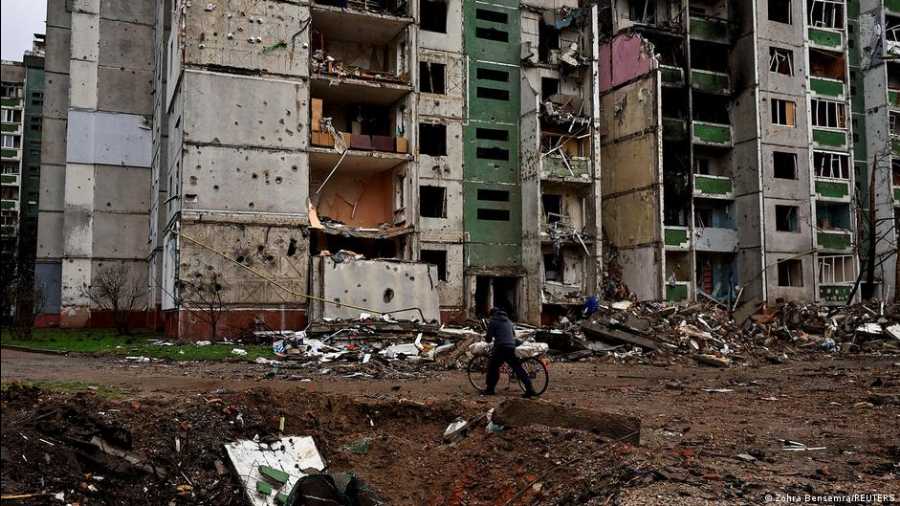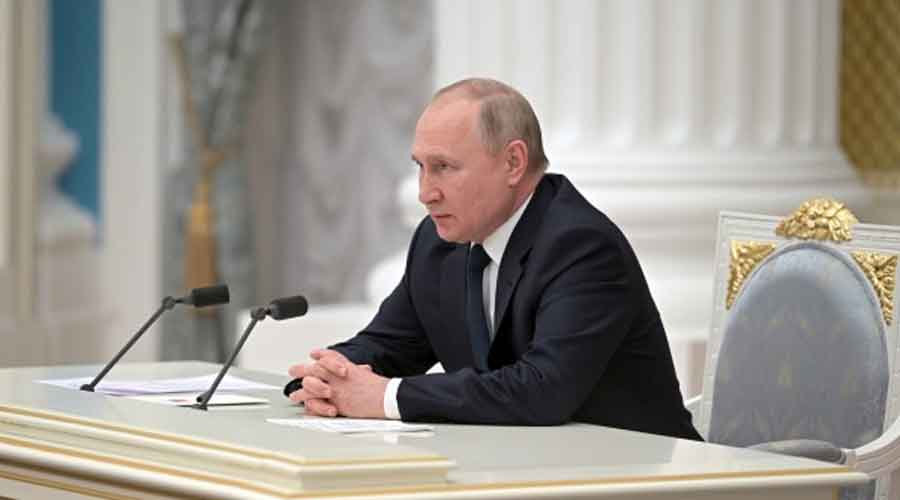Powerful explosions were heard in Kyiv early on Friday, and air raid sirens blared across Ukraine as residents braced for new Russian attacks after Moscow's lead warship in the Black Sea sank following a fire.
The explosions appeared to be among the most significant in Ukraine's capital region since Russian troops pulled back from the area earlier this month in preparation for battles in the south and east.
Ukraine claimed responsibility for sinking the Moskva, saying the Soviet-era flagship of Russia's Black Sea fleet was struck by one of its missiles. The vessel sank late on Thursday as it was being towed to port, Russia's defence ministry said.
Over 500 crew aboard the missile cruiser were evacuated after ammunition on board exploded, the ministry said, without acknowledging an attack. Ukraine says it hit the warship with a locally made Neptune anti-ship missile.
The ship's loss comes as Russia's navy continues its bombardment of Ukrainian cities on the Black Sea nearly 50 days after it launched the invasion. Residents of Odesa and Mariupol, on the adjacent Azov Sea, have been bracing for new Russian attacks.
Ukrainian President Volodymyr Zelensky alluded to the sunken warship in an early morning video address in which he warned of Russian intentions to target the eastern Donbas region, including Mariupol.
Zelensky paid homage to all "those who halted the progress of the endless convoys of Russian military equipment ... Those who showed that Russian ships can go ... down to the bottom."
There were no immediate reports of damage following the explosions reported in Kyiv, Kherson in the south, the eastern city of Kharkiv and the town of Ivano-Frankivsk in the west. Ukrainian media reported electricity outages in parts of Kyiv.
Air raid sirens went off in all regions of Ukraine just after midnight on Friday and continued blaring in the eastern regions of Luhansk and Zaporizhzhia even after those elsewhere went quiet, Ukrainian media said. Reuters could not immediately verify the reports.
MOSKVA
Whatever the cause of the Moskva's loss, the episode is a setback for Russia. If Ukraine's assertion that it hit the ship in a missile strike turns out to be true, the attack will go down in history as one of the highest-profile naval attacks so far this century.
Russia's defence ministry said it is investigating the cause of the fire on board. The United States said it did not have enough information to determine whether the Moskva was hit by a missile.
"(But) certainly, the way this unfolded, it's a big blow to Russia," said national security adviser Jake Sullivan. Russian forces have pulled back from some northern parts of Ukraine after suffering heavy losses and failing to capture Kyiv. Ukraine and its Western allies say Moscow is redeploying for a new offensive in the eastern Donbas region.
Russia launched its assault in part to dissuade Ukraine from joining NATO. But the invasion has pushed Finland, which shares a long border with Russia, and nearby Sweden to consider joining the U.S.-led military alliance. Moscow warned NATO on Thursday that if Sweden and Finland join, Russia would deploy nuclear weapons and hypersonic missiles in a Russian enclave on the Baltic Sea, in the heart of Europe.
Commenting on Russia's military setbacks, CIA Director William Burns said the threat of Russia potentially using nuclear weapons in Ukraine cannot be taken lightly, but that the agency has not seen much practical evidence reinforcing that concern.
BATTLE FOR MARIUPOL
Moscow describes its invasion as a "special military operation" aimed at demilitarising Ukraine. Kyiv and its allies say Russia has launched an unprovoked war that has seen more than 4.6 million people flee abroad and killed or wounded thousands.
Russia's navy has fired cruise missiles into Ukraine and its Black Sea activities are crucial to supporting land operations in the south and east, where it is battling to seize full control of Mariupol.
Russia said on Wednesday that more than 1,000 Ukrainian marines from one of the units still holding out in Mariupol had surrendered. Ukrainian officials did not comment.
If taken, Mariupol would be the first major city to fall to Russian forces since they invaded, allowing Moscow to reinforce a land corridor between separatist-held eastern Donbas areas and the Crimea region it seized and annexed in 2014.
Ukraine said tens of thousands of people were believed to have been killed in Mariupol, where efforts were under way to evacuate civilians.
Russia's defence ministry said late on Thursday that 815 people had been evacuated from the city over the past 24 hours. Ukraine said that figure was 289.
US cannot 'take lightly' threat Russia could use nuclear weapons: CIA chief
Washington: The threat of Russia potentially using tactical or low-yield nuclear weapons in Ukraine cannot be taken lightly, but the CIA has not seen a lot of practical evidence reinforcing that concern, CIA Director William Burns said on Thursday.
Burns' most extensive public comments since Russia invaded Ukraine on Feb. 24 underscored concerns that the biggest attack against a European state since 1945 risks escalating to the use of nuclear weapons.
Earlier on Thursday, Dmitry Medvedev, deputy chairman of Russia's Security Council and a close ally of Russian President Vladimir Putin, warned NATO that Moscow would deploy nuclear weapons and hypersonic missiles in Kaliningrad, a Russian enclave in the heart of Europe, if Sweden and Finland joined the Atlantic alliance.
Burns spoke at Georgia Tech of the "potential desperation" and setbacks dealt Putin, whose forces have suffered heavy losses and have been forced to retreat from some parts of northern Ukraine after failing to capture Kyiv.
For those reasons, "none of us can take lightly the threat posed by a potential resort to tactical nuclear weapons or low-yield nuclear weapons," Burns said.
That said, despite "rhetorical posturing" by the Kremlin about putting the world's largest nuclear arsenal on high alert, "We haven't seen a lot of practical evidence of the kind of deployments or military dispositions that would reinforce that concern.”
Tactical and low-yield nuclear weapons refer to those designed for use on the battlefield, of which some experts estimate Russia has about 2,000 that can be delivered by air, naval and ground forces.
Burns' comments came in response to a question from former U.S. Senator Sam Nunn, a leading arms control advocate, at the end of the CIA chief's first public speech since taking the helm of the premier U.S. spy agency in March 2021.
In a wide-ranging address, the former career U.S. diplomat said U.S. spy agencies began last fall collecting "disturbing and detailed" intelligence on a plan by Putin for a "major new invasion" of Ukraine.
Burns said President Joe Biden dispatched him to Moscow in November "to convey directly to Putin and several of his closest advisers the depths of our concern about his planning for war, and the consequences for Russia" if they proceeded.
"I was troubled by what I heard," he continued, saying that while Putin may not have made a final decision, he appeared convinced his forces would "achieve a quick decisive victory at minimal costs."
Putin believed Washington's European allies were distracted by their own domestic politics and he had a "sanctions-proof" war chest of foreign currency reserves, Burns said.
"Putin was proven wrong on each of these counts," he said.
The Russian leader "stewed" in grievance, ambition and insecurity and apparently saw the "window was closing for shaping Ukraine's orientation" away from the West, said Burns, who called Putin an "apostle of payback."
US intelligence has been vital to Ukraine's fight against Russian forces, said Burns, whose diplomatic posts included one as U.S. ambassador to Moscow.
The "crimes" he said those forces committed in the Ukrainian town of Bucha are "horrific." Russia, which has repeatedly denied targeting civilians, has called the accusations its forces executed civilians in Bucha while occupying the town a "monstrous forgery" aimed at denigrating the Russian army.
The Kremlin says it launched a "special military operation" to demilitarize and "liberate" Ukraine from nationalist extremists. In other remarks, Burns called China a formidable competitor seeking to overtake the United States in every domain, from economic and military power to space and cyberspace.
China’s ambitions under its leader Xi Jinping are “quite threatening,” and include the possibility that Beijing would seek control over Taiwan by military means, he said.
“The further out we get in this decade, the greater that risk becomes," he said.











